

AUGUST 2023
The Official Publication of the Hawaii Society of Certified Public Accountants
CPACharge has made it easy and inexpensive to accept payments via credit card. I’m getting paid faster, and clients are able to pay their bills with no hassles.
–Cantor Forensic Accounting, PLLC


Trusted by accounting industry professionals nationwide, CPACharge is a simple, web-based solution that allows you to securely accept client credit and eCheck payments from anywhere.
22%
65% of consumers prefer to pay electronically


62%

Get started with CPACharge today cpacharge.com/hscpa
*** PAY CPA
TOTAL: $3,000.00
increase in cash flow with online payments
AffiniPay customers experienced 22% increase on average in revenue per firm using online billing solutions CPACharge is a registered agent of Synovous Bank, Columbus, GA., Fifth Third Bank, N.A., Cincinnati, OH, and Wells Fargo Bank, N.A., Canadian Branch, Toronto, ON, Canada.
of bills sent online are paid in 24 hours
+ Member Benefit Provider
Officers
President Ryan K. Suekawa
President-elect Frank T. Kudo
Vice President Trisha N. Nomura
Secretary/Treasurer Chad K. Funasaki
Assistant Secretary Adrian K. Hong
Directors • 2023 – 2025
Ronald I. Heller
Adrian K. Hong
Nelson K. Lau
Darryl K. Nitta
Grayson Y. Nose
Gordon M. Tom
Directors • 2022 – 2024
Chantal Mentzer (KAUAI)
Norman N. Okimoto
Joel C. Peralto (BIG ISLAND)
Immediate Past President
Edmund N. Nakano
The Official Publication of the Hawaii Society of Certified Public Accountants
AICPA Council
Darryl K. Nitta (Designated)
Ryan K. Suekawa (Elected)
Executive Director
Kathy M. Castillo
Administrative Assistant
Debbie Cortes
Graphic Design

Underwood Graphics underwoodgfx.com
Hawaii Society of CPAs 1000 Bishop Street, Suite 802
P.O. Box 1754
Honolulu, Hawaii 96806
Tel: (808) 537-9475

Fax: (808) 537-3520
E-mail: info@hscpa.org
Website: www.hscpa.org
By Ryan Suekawa
This publication is designed to provide general information only, and should not be used as a substitute for professional advice. The authors and editors disclaim any liability for any loss or damage resulting from the use of any information or advice herein. Although a reasonable attempt has been made to be accurate, neither the HSCPA nor the authors and editors can guarantee that all information contained herein is correct as of the date of publication.
KALA (the Hawaiian word for money) is published monthly and is the official publication of the Hawai‘i Society of Certified Public Accountants. Please direct all inquiries regarding editorial content to HSCPA, 1000 Bishop Street, Suite 802, Honolulu, Hawai‘i 96813.
KALA AUGUST 2023 3
Issue President’s Message ..................................4
In This
Study the Empty Homes Tax Again?............5 By
3 reasons firms should offer client advisory services (CAS)....................6 By Jeremiah LaRue Small actions, big fallout: Lessons from large claims..........................8 By Sarah Beckett Ference How Can an Accounting Firm Become an Employer of Choice?...........10 By Steve Evans and Giles Pearson 2023 Annual Conference......................12 Norman’s Book Review.........................14 Highlights of the 2023 Annual Election & Business Meeting.................16 Goodbye, BEC: Understanding the New CPA Exam............................... 18 By Megan Lewczyk CPA Firm Microcomputer Technology...19
Tom Yamachika
By Joy Takaesu
President’s Message
 By Ryan K. Suekawa
By Ryan K. Suekawa
It’s August 2023 and the first half of the summer season is coming to an end. I have a lot of fond non-work memories of summer family traditions – fun trips, beach days, summer jobs, sports, and barbeque. Merriam Webster’s Dictionary defines a tradition as: “the handing down of information, beliefs, and customs by word of mouth or by example from one generation to another without written instruction”.
At the HSCPA, we have lots of traditions as well. Some of them are: our Annual Conference has the best breakfast buffet (so go early); we get the best speakers at our meetings, and you get good swag stuff when you attend. Registration link for the 63rd Annual Conference is here.
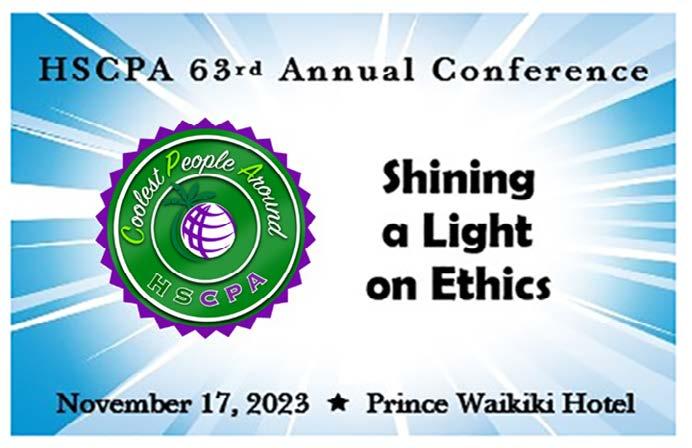
For those of us in public practice or industry, our August traditions probably involve looking at our staffing plan, recruiting, and outreach activities for the upcoming year. With that in mind, I’d like
to remind everyone about a few events to help support our HSCPA traditions of supporting Hawaii’s accounting profession.

• Meet the Pros – The 2023 Meet the Pros event will be held on Thursday, November 16, 2023 at Dave & Busters.Students will get the opportunity to meet professionals from various segments of the accounting profession. Additionally, our guest speaker is Okorie Ramsey, who currently serves as the Chairman of the American Institute of Certified Public Accountants.
• Hawaii Foodbank – The first community service event in the fiscal year is packing Senior boxes at the Hawaii Foodbank. Join us on Saturday, August 19th for several hours of a do-good deed for Hawaii’s kupuna. You can volunteer at info@hscpa.org.
• Give Back Day Beach
Clean-Up – A huge Thank You to our Y-CPA Squad for all the events they plan. Especially, Thank You to Adrian Hong, president of Island Plastic Bags (an esteemed member of the Y-CPA Squad and HSCPA Board) for sponsoring our Give Back Day Beach Clean-Up event. This community service project is usually held in conjunction with Earth Day. The beach clean-up was held in April 2023.
• Spark interest in accounting to middle and high school students –
Our dedicated group of young professionals have made over a dozen presentations at middle schools, high schools and colleges over the past fiscal year. We have a goal of speaking at least 10 high schools over the upcoming fiscal year. But, we need more volunteers to speak at schools. Please contact info@hscpa.org if you or your company would like to send volunteers to speak at a school (especially your alma mater). We have presentations ready to use, and are seeking speakers to help share real-life experiences with students.
I hope the last half of summer is enjoyable for all of you. Thank you for everything you do to support our profession!
4 KALA AUGUST 2023
If you’re not already a supporter of the Tax Foundation of Hawaii (TFH), it’s never too late. TFH is the ‘watchdog’ for Hawaii taxpayers and keeps us informed of what the government is doing with taxpayers’ money. To support TFH’s mission, please donate here.

Study the Empty Homes Tax Again?
One concept that has popped up again, more often than the little animals in a Whack-a-Mole game, is the prospect of an “Empty Homes Tax.”

Simply put, if someone owns property here but doesn’t live in it for, say, six months out of the year, then we charge that someone a hefty real property tax surcharge. Why? Because that someone has removed a housing unit from circulation in a place where we really, really need housing units. Just last year, for example, the Honolulu City Council was considering a bill (Bill 9 of 2022) that would have set the tax at 3% of the property value, per year.
Last year, when we wrote about this development, we pointed out that there would be lots of devils in the details. How does one hope to enforce such a tax without running roughshod over people’s privacy (which is constitutionally protected in this State)? Do we simply require everyone to file a form, every year, saying that “1234 Aloha Drive is my home, and I have lived in it for more than six months this year,” assume that the folks who haven’t sent the form in have vacant property, and then throw them to the wolves in the City’s tax collection agency? How would we deal with the resulting flood of people who

(1) never heard about the new law, form, or tax, (2) figured out that there was a tax and a form, but for whatever reason filed the form too late, or (3) had good reasons for not living in the house, such as being hospitalized for a substantial part of the year?
First, am I the only one wondering what in the world a vacant homes tax has to do with the COVID-19 pandemic so as to justify funding this study with pandemic relief funds? Second, what about the study done by the UCLA Luskin School of Public Affairs that the City had done in 2021? Is this new study going to cover the same ground, and if it does, why are we taxpayers getting hit for another one? So that two independent consultants, when the City asks, “Can we, pretty please, impose this tax?”, reply with, “Yeah, we suppose so”?
This year, the City & County of Honolulu is trying again. They are on the path toward commissioning a study, projected to go out for bid in August, that seeks to determine “why so many homes are vacant, and how a vacant homes tax could benefit Honolulu’s many residents who lack suitable housing. Benefits to be explored should include contributions to a housing fund, discouraging the ‘hoarding’ of empty properties and encouraging owners to rent these properties to Hawaii households.” The Star-Advertiser appears to be on board with this idea, as it stated in an editorial on July 14th. City officials say that the study will be paid for with federal pandemic relief money, so residents don’t have to worry about its cost.
If we can’t get out of that second study, we should at least have it address new developments, such as a paper put out by the Grassroot Institute saying, in effect, “Vacant homes don’t cause obscene housing prices, but a screwed-up building permitting system sure does!”
Folks on the Neighbor Islands: Don’t laugh. You might be next!
Tom Yamachika is President of the Tax Foundation of Hawaii - the ‘watchdog’ that keeps an eye on Hawaii’s taxes. Tom is also the owner of Aloha State Tax, a small law firm with emphasis on State taxes. Prior to going solo and the TFH, Tom was a principal with Accuity LLP where he managed the tax consulting practice, including quality and risk management and practice development.

KALA AUGUST 2023 5
3 reasons firms should offer client advisory services (CAS)
By Jeremiah LaRue, Product Marketing Manager, CAS, CPA


Why are client advisory services (CAS) fueling so much growth in the accounting profession today? Businesses are encountering more change at a faster pace, and they need help making smarter decisions faster.

Meanwhile, firms are seeking ways to better support these needs with the help of a host of new advanced technology that allows them to deliver and scale value-added advisory services more efficiently than ever, increasing revenue and driving firm growth. Those are some of the top reasons why our latest
CAS Benchmark Survey reported a 16% median growth rate in CAS services, with more than 80% of top performing firms saying they anticipated more demand and strong pipelines.
We’ve worked with many firms in helping them shape their CAS strategy, going on to successfully launch new practices or re-envision existing ones. While each firm has its own reasons for taking this important step, certain motivating factors stand out time after time. Here are the top reasons why firms are committing to and investing in a long-term CAS strategy.
Provide deeper insights and more value to clients, reinforcing the role of a trusted and strategic advisor
The quest to deliver more client value isn’t new for firms. But the obstacles have been significant. Lack of capacity becomes a gatekeeper preventing firms from going beyond standard client deliverables.
For those who look beyond the challenges at the opportunities, they see that technology is a catalyst for transformation.
6 KALA AUGUST 2023
The technology we’ve seen in the past is now no longer transformative, but table stakes. Things like cloud-based services have made it easier than ever to collaborate with clients on a deeper level and deploy new services. And automation has streamlined the time-consuming work that serves as the foundation for insight delivery, freeing up more time for staffers to focus on higher-value client services such as forecasting, risk management and using data to deliver faster insights to inform clients’ decision-making.
As a result, firms can simply deliver a lot more, to more clients, than at any time before. Those that have taken advantage of these tools by creating intentional people and processes around them are able to drive success in their CAS practice more quickly. They can expand beyond traditional transactional services to more forward-looking, strategic advisory services built on insight – and their clients are willing to pay. Plus, as many deepen their focus on industry verticals through their CAS practices, they are creating an engine of new business development powered by their growing reputation and expertise.
Attract and retain the best people
Finding (and keeping) talent is one of the biggest challenges facing accounting firms today. CAS is playing an important role here, too. Firms are finding that their CAS practice is leading with a technologyforward, advisory-focused approach which is highly attractive to qualified candidates for key roles. Why? For starters, technology-centric CAS practices create significant growth opportunities for staffers. Entry-level staff who typically
perform manual and mundane tasks benefit from a structure that allows them to focus on gaining invaluable advisory and technology experience while still servicing clients and supporting the firm.
CAS practices are also able to attract and retain higher-caliber professionals who tend to avoid firms that rely on outdated manual processes and baseline technologies for fear of a lack of professional growth and of getting sucked into the same old ways of doing business. When they look at CAS practices who have leadership support, they see progressive firms putting forward-looking, technology-driven innovation to work. Which is exactly what top talent is looking for today.
Create sustainable relationships and revenue streams over the long-term

While some service offerings deliver a jolt of revenue only at certain times of the year, CAS delivers a predictable, ongoing revenue stream. That’s because successful CAS practices employ a subscription pricing model which requires regular client interactions. These interactions become a foundation to build client relationships and trust. When there is trust combined with perceived and communicated value, often times price is an afterthought. The most successful CAS practices meet with clients regularly—not just once a month or once a quarter but bi-weekly, weekly or even more frequently.
Just as important, CAS lays the groundwork for future growth. CAS practices that start by providing financial accounting services tend to expand into deeper insight-based advisory services over
time, deepening their relationships with clients as they go. And there is a natural progression from accounting to advisory. For example, providing financial reports, processing accounts payable and managing expenses leads to cash flow management which can lead to a host of other insights-driven CAS.
Some primary examples of insightsdriven CAS are spend management advisory, financial planning and analysis (FP&A) advisory and financing advisory. These value-added services become a springboard to introduce additional advisory opportunities like human capital management, wealth management, data analytics, cybersecurity, ESG advisory, SALT advisory and more. That’s a recipe for sustainable growth over time.
Ready to start your CAS journey?
If you’re joining the growing number of firms that are seeking CAS best practices to create deeper relationships with clients, attract and keep top talent and develop a new source of growth and revenue, we have good news for you. CPA. com has been leading the way in CAS for years, and we have lots of practical resources and insights to guide you. Download your copy of the CAS Benchmark Survey Report to learn best practices based on data from firms across the country.
Visit www.cpa.com/cas to dig into all the on-demand webinars, whitepapers, articles, and case studies you need to make CAS a success for your firm.
Jeremiah LaRue is Product Marketing Manager, CAS, CPA.com.
KALA AUGUST 2023 7
Small actions, big fallout: Lessons from large claims
By Sarah Beckett Ference, Risk Control Director, CNA

Unfortunately, seemingly benign actions do not always turn out to be so. Even small decisions or quick conversations may have significant, and expensive, consequences. Consider these real-life claims asserted against CPAs in the AICPA Professional Liability Insurance Program and take note of lessons that were learned the hard way.
Failure to Search
The case:
A CPA prepared tax returns and provided bill-paying services for a client. When the client inherited a substantial amount of money, it asked the CPA to assist in managing this newfound wealth. The CPA agreed and invested approximately $2.5 million with an investment adviser who was recommended by another client of the CPA. Eventually, the invested funds were lost due to the adviser’s alleged fraudulent activity. The client filed suit against the
CPA for failure to exercise due diligence in selecting the adviser.
While the CPA’s actions were taken in good faith and in the belief that they were in the client’s best interests, the CPA did not perform any due diligence procedures related to the adviser, relying solely on the recommendation of the other client. A simple internet search, however, would have revealed that the investor was previously convicted of financial crimes.
The outcome:
The case settled with defense costs and an indemnity payment of more than $500,000.
The lesson:
While the depth and type of due diligence procedures vary based upon the situation and service to be provided, performing a basic internet search before accepting a new client, or making a recommendation to an existing one, is
REAL ESTATE SOLUTIONS
Real Estate Appraisal Valuation:
• Commercial & Residential
• Retrospective Value / Date of Death

• Trust, Pension and Estate
a quick and easy — but crucial — step for a CPA to take, even if the referral source is a trusted one.
The other lesson:
Clients often seek a CPA’s advice related to investments. However, providing incidental advice is fraught with risk, and the CPA may be blamed for poor investment performance. Avoid providing investment advice unless you have the requisite experience in the area, have been engaged via a separate engagement letter for the service, and follow the AICPA Statement on Standards in Personal Financial Planning Services.
Creeping Scope
The case:
www.yamaguchiinc.com
www.REMMPacific.com
Phone: (808) 533-8849
Real Estate Counseling:
• Strategic Planning
• Commercial Lease Negotiations
• Commercial Brokerage & Leasing
Jon Yamaguchi: jon@yamaguchiinc.com
Stephanie Yamaguchi: stephanie@yamaguchiinc.com
For decades, a CPA was engaged to provide tax compliance and compilation services to a medical practice with a history of declining revenues. After several years of providing services, the CPA eventually issued an engagement letter. A year later, the client terminated its controller and bookkeeping staff, accusing them of embezzling millions of dollars via a fictitious payroll scheme. The client, alleging that the CPA’s engagement scope was much broader than what was included in the engagement letter, asserted that the CPA should have detected the embezzlement. Unfortunately, and despite what was reflected in the engagement letter for a prior period, the CPA’s workpapers and client communications suggested a broader and poorly defined engagement scope. In addition, the CPA had copies of the client’s payroll records
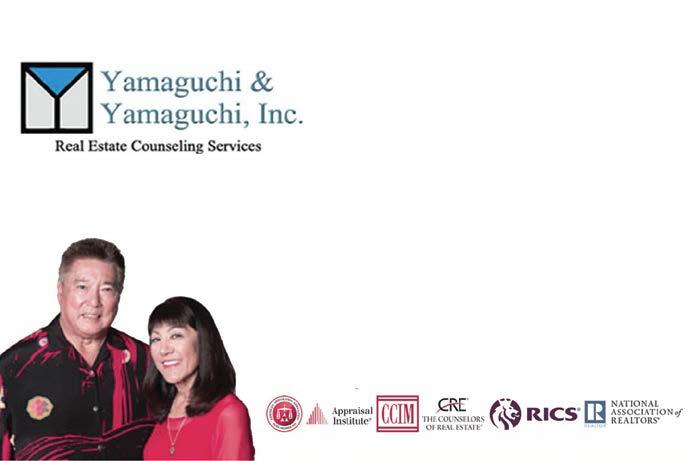
8 KALA AUGUST 2023
Partners
Valuers (JV): http:www.japanvaluers.com/en/
Jon F. Yamaguchi is a member of:
with Japan
showing client employees claiming hours far in excess of customary working hours (in some cases, claiming nearly 24 hours in a single day), which arguably should have been a red flag. Finally, the CPA’s workpapers reflected knowledge of substantial weaknesses in the medical practice’s internal controls, but the CPA never conveyed these concerns to the client.
The outcome:
The case settled with defense costs and an indemnity payment of more than $900,000.
The lesson:
Consistent use of annual engagement letters helps manage the client’s expectations regarding the scope of services and the limitations of such services. If a client requests additional services, document the additional scope of work through a new engagement letter, an addendum to an existing engagement letter, or, at a minimum, an email with the client.
The other lesson:
o help defend a claim asserting a failure to detect an embezzlement, regardless of service, inform the client, in writing, of improper segregation of duties or other internal control weaknesses, especially those related to cash handling. In addition, inspect documentation received and inform the client, in writing, of red flags or unusual items.
Off-the-Cuff Advice
The case:
A CPA prepared tax returns for a married couple for a number of years until the couple informed the CPA of their impending divorce. During the couple’s divorce proceedings, the CPA provided advice to the husband for a short time without first obtaining a waiver from or officially terminating the relationship with the wife. The
wife claimed that within that period, the CPA wrongfully advised the husband that he could withdraw money held in joint bank accounts even though such withdrawals violated the couple’s prenuptial agreement.
The CPA recalled telling the husband that he believed he would be entitled to half of the joint account but did not have the prenuptial agreement in hand. As such, he verbally advised the husband to consult with his divorce attorney on the issue. There was no documentation related to this discussion with the husband.
The outcome:
The case settled with defense costs and an indemnity payment of approximately $1.5 million.
The lesson:
Answering seemingly benign questions based on incomplete or partial information can have significant consequences. Avoiding answering these questions, while preferable, is not always possible or practical. Whenever advice is provided, follow up the discussion with a written communication, such as an email.
The other lesson:
A conflict of interest, or even the appearance of an ethical violation, can greatly complicate the defense of a claim. Here, the defense expert opined that despite the short period during which the conflict existed, the case would be very difficult to defend, and the CPA should not have discussed the issues with the husband.
A Final Lesson
In all of these cases, the engagement letter was either nonexistent, as in the cases of “Failure to Search” and “Off-the-Cuff Advice,” or inconsistent and ineffective, as in the case of “Creeping Scope.” Had engagement letters been in place, the outcomes may have been different.
About the Author
Sarah Beckett Ference is a risk control director at CNA. For more information about this article, contact specialtyriskcontrol@ cna.com.
This information is produced and presented by CNA, which is solely responsible for its content. Continental Casualty Company, a member of the CNA group of insurance companies, is the underwriter of the AICPA Professional Liability Insurance Program.
The purpose of this article is to provide information, rather than advice or opinion. It is accurate to the best of the authors’ knowledge as of the date of the article. Accordingly, this article should not be viewed as a substitute for the guidance and recommendations of a retained professional. In addition, CNA does not endorse any coverages, systems, processes or protocols addressed herein unless they are produced or created by CNA.
Any references to non-CNA Web sites are provided solely for convenience, and CNA disclaims any responsibility with respect to such websites.
Examples are for illustrative purposes only and not intended to establish any standards of care, serve as legal advice, or acknowledge any given factual situation is covered under any CNA insurance policy. The relevant insurance policy provides actual terms, coverages, amounts, conditions, and exclusions for an insured. All products and services may not be available in all states and may be subject to change without notice.
“CNA” is a registered trademark of CNA Financial Corporation. Certain CNA Financial Corporation subsidiaries use the “CNA” trademark in connection with insurance underwriting and claims activities.
Copyright © 2023 CNA. All rights reserved.

KALA AUGUST 2023 9
In order for your firm to hire and retain top talent, it is important to understand the value of creating an environment that employees can feel comfortable in. We all know that a great team of dedicated professionals is essential for any successful enterprise, but how do you go above and beyond to make your firm a desirable employer? In this blog post, we will discuss practical ways that your firm can become an employer of choice not just with new hires, but current staff as well. Through showcasing company values, emphasizing professional growth opportunities, creating a flexible atmosphere and courteous interactions between management and staff - we’ll help you inspire your ideal applicants!

Establish a culture of respect and appreciation among staff members
Creating a culture of respect and appreciation amongst staff, and an environ-

ment where everyone feels empowered and valued sets the stage for growth and innovation. As the company grows, it’s crucial to establish trust with all employees, developing channels of communication and fostering positive interactions outside of all that work chat. Our friend Brenton Ward over at WIZE Mentoring (www.wizementoring.com) suggests that creating a no blame culture is a key component of a healthy work environment attractive to potential employees. “Create a culture where everyone is accountable to building extraordinary systems to run the business. And when something goes wrong, the team takes ownership of the problem/challenge and pledges to improve the system as opposed to looking around for someone to blame for the problem. This creates a solutions focused environment.”
Brenton also mentioned the importance of showing vulnerability at a leadership
level: “when leaders show vulnerability it creates an environment of trust and safety for team members to do the same. This helps us move through challenges swiftly and encourages everyone to take ownership of their role and responsibilities, knowing they can put their hand up without judgement and say, “I need help” “I stuffed up” “I don’t know what to do here” “I need support”.”
Allow employees to demonstrate their value to the team by encouraging their input and celebrating accomplishments. Creating a positive working atmosphere in which respect and appreciation are shared can foster overall success, attracting candidates to apply.
Encourage flexible working hours and remote work options to make life easier for employees
Consider implementing flexible working
10 KALA AUGUST 2023
hours and remote work options. Such policies can not only make life easier for employees, but also help to create a more positive and inclusive workplace atmosphere. You might already notice younger candidates actively seeking out flexible working policies. Providing such opportunities can remove the traditional nine-to-five pressure from employee’s lives, allowing them to better balance their personal and professional priorities.


Creating policies that offer shared goal setting, feedback loops, effective communication strategies and defined performance metrics can ensure each employee is given equitable opportunities for success regardless of where they are physically working from. As our friend Michael Ly from remote accounting firm Reconciled (www.reconciled.com) put it, the key to successful remote working is “regularly connecting as a team remotely to create a sense of belonging to and being part of a larger team.” Ultimately,
these measures will create a more attractive place to work with higher levels of job satisfaction.
Provide professional development opportunities such as courses, conferences, or seminars
Create a motivating and productive work environment by prioritizing professional development opportunities is key to any successful organization, as they can help team members to stay up-to-date on the latest trends and skills related to their profession. Facilitating such opportunities for employees – such as courses, conferences, and seminars improves employee retention but will also build a sense of loyalty within the team. Investing in the professional development of your team reinforces recognition of talent, an attractive consideration for prospective candidates. There are some great podcasts your team can listen to as well, which are always discussing the cut-
ting edge of change in accounting – for example the Cloud Accounting Podcast (www.cloudaccountingpodcast.com)



Give employees access to the latest technology tools and software
In today’s competitive job market, it pays to invest in staying ahead of the curve. Giving your employees access to stateof-the-art technology tools and software results in a productive and efficient work environment and keeps up with changing industry regulations and trends – allowing your firm to thrive. Showing your employees that you are willing to invest in them and their work environment will demonstrate how much you value them for the skills they bring to the workplace.
Offer competitive salaries and benefits to attract the best talent


Prioritize offering competitive salaries

Continued on page 19

KALA AUGUST 2023 11
Top Producing Agent by Units & Dollar Volume 2014 WARD VILLAGE Top Producing Agent by Units & Dollar Volume 2015 WARD VILLAGE John “Jack” Tyrrell President Principal Broker, CRS, CRB CPA (not in public practice) Lic. # RB-19880 E: Jack@jtchawaii.com C: 808.306.6933 www.jtchawaii.com Ala Moana Hotel - Lobby, 410 Atkinson Drive, Suite 1F6 Honolulu, HI 96814 A Real Estate Brokerage Corporation * The information presented herein is provided as is, without warranty expressed or implied of any kind. Information herein deemed reliable but not guaranteed. Please call May or Jack : 808 532 3330 1 BD, 1 BA Intr Size: 559 ft² / 52 m² Lanai: 44 ft² / 4 m² Storage: 1, Prk: 1 Views: Ocean & City #3600 $1,050,000 unit 1 BD, 1 BA Intr Size: 509 ft² / 47 m² Lanai: 58 ft² / 5 m², Prk: 1 Views: Ocean, Park & City #1503 $870,000 unit KO`ULA Ward Village `A`ALI`I Ward Village
HSCPA 63rd Annual Conference
November 17, 2023

Prince Waikiki Featuring Ethics for Hawaii CPAs
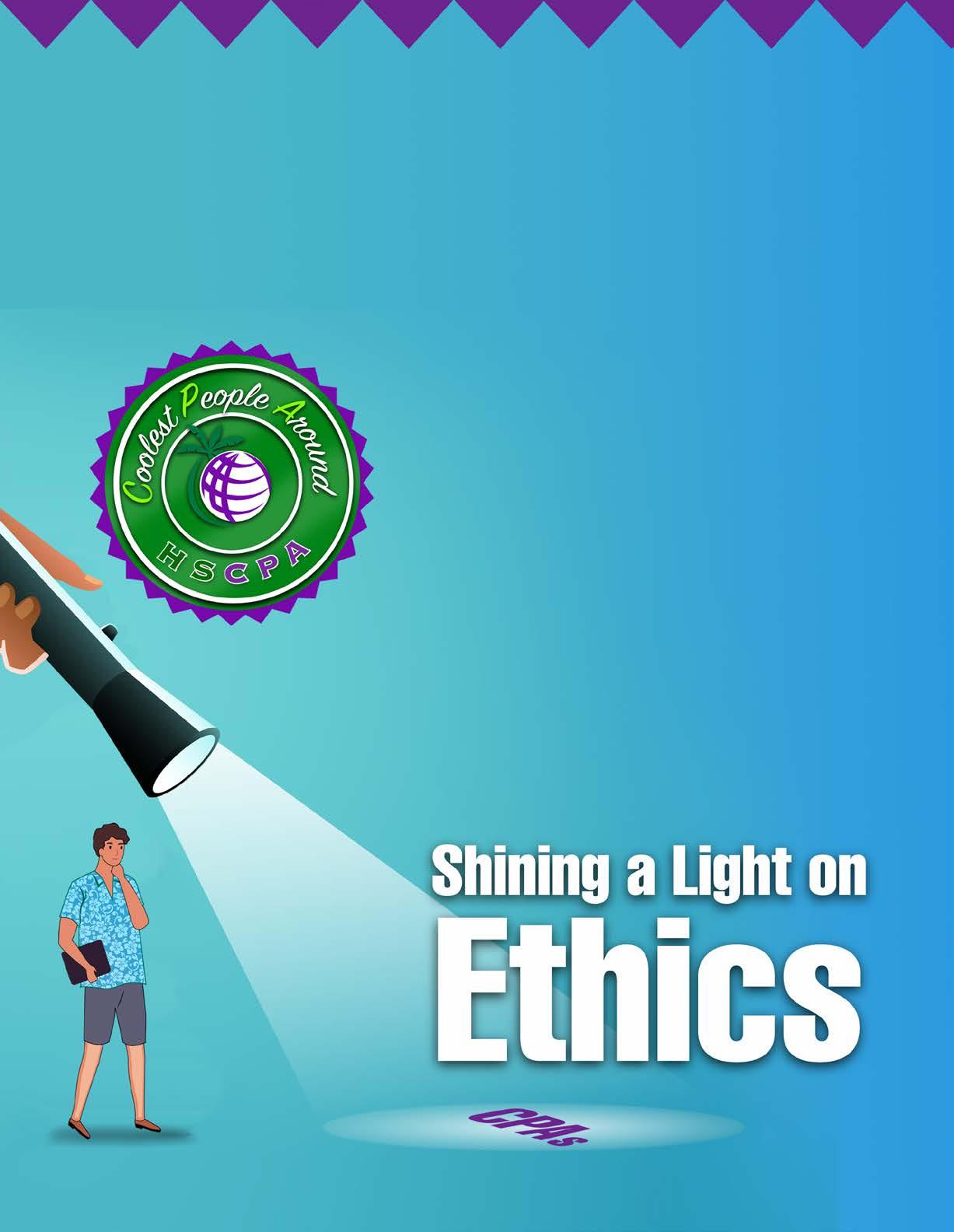
C.P.A.s . . .
Hard-to-beat line-up at the 63rd Annual Conference with Okorie Ramsey, Chair of the American Institute of CPAs and Association of International Certified Professional Accountants, here to open the Conference. He will discuss the latest updates on trends and issues and the pipeline challenges impacting the accounting profession. Okorie will illustrate how the profession continues to transform as we Rethink, Reshape and Reimage to deliver value and growth.
It’s a reporting year and you’ll need the 4 hours of Ethics CPE for license renewal. HSCPA’s finest, Ron Heller, will provide an update on professional ethics and explain recent interpretations of the AICPA Code of Professional Conduct. Ron will teach you how to identify, analyze and respond to conflicts of interest, how to apply independence rules in your practice, and key rules regarding client confidentiality. The presentation will also cover recent Hawaii developments and tips to avoid malpractice claims or liability.
HSCPA ‘adopted’ Charles “Chuck” Rettig many years ago when he frequented the islands giving numerous presentations on tax controversies. In 2018, Chuck became the U.S. IRS Commissioner where he served during a unique period as the nation dealt with pandemic challenges and closures. A great opportunity and privilege as Chuck will ‘talk story’ with us sharing his experience of the IRS operations.
Timely updates, necessary information, and fun stories for 7 hours of CPE, breakfast, lunch, and yes, Happy Hour! Don’t miss this event and Register now!
12 KALA
2023
AUGUST
ETHICS CPE • FOOD • FUN • HAPPY HOUR
GREAT SPEAKERS AND TOPICS!
Okorie Ramsey currently serves as the Chairman of the American Institute of Certified Public Accountants (AICPA) and the Association of International Certified Professional Accountants (the Association), and previously served on various not-for-profit boards supporting diversity, equity and inclusion in the fields of accounting and finance including the California Society of CPAs Education Foundation, the National Association of Black Accountants (NABA, Inc.), the Accounting Career Awareness Program (ACAP), and LIFE Courses.
Okorie is the Vice President, Sarbanes-Oxley (SOX) for Kaiser Foundation Health Plan, Inc., and Kaiser Foundation Hospitals. In this role, he has responsibility and oversight for the SOX Program, including strategy, testing, and evaluating internal controls and assessing business risk to assist in building an effective internal control over financial reporting for the integrated health care enterprise.
Prior to his current role, Okorie held the position of Vice President, Finance Compliance Officer, where he was responsible for establishing a finance compliance program to support compliance with regulatory and enforcement agencies as well as leading compliance investigations and co-developing remediation activities to address issues identified. In addition to these finance executive roles, Okorie has served in management and leadership roles in public accounting and business and industry.
Ron Heller, is Of Counsel at Torkildson Katz, A Law Corporation. He has been practicing law in Hawaii for over 40 years, concentrating on tax litigation, tax law, and business disputes, primarily dealing with accounting and financial issues. He is a licensed Certified Public Accountant as well as an attorney. Ron is a Fellow of the American College of Tax Counsel and a past Chair of the Tax Section of the Hawaii State Bar Association. He has litigated tax cases at the county, state, and federal levels.
In addition to tax cases, Ron has represented clients ranging from individual sole proprietors to multi-national corporations in a wide variety of business disputes, in court and in arbitration proceedings. He served as an Adjunct Professor at the University of Hawaii School of Law and has taught a number of continuing professional education courses for attorneys, CPAs, and other professionals.
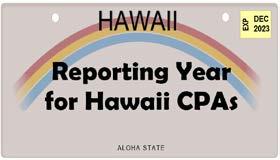
Ron’s efforts have led to peer recognition, including the maximum 5 out of 5 peer rating and an AV Preeminent Rating by Martindale-Hubbell. He

also received a perfect 10 AVVO Rating as a “Top Tax Attorney” and has been listed as one of the “Best Lawyers in America” in the area of tax law for more than 25 years. In addition, Ron was named Lawyer of the Year in 2021 for Tax Law in Honolulu, Hawaii by Best Lawyers®, which also selected him as Lawyer of the Year 2019 in Litigation and Controversy –Tax for Honolulu, Hawaii.
Charles “Chuck” Rettig served as the 49th United States Commissioner of Internal Revenue from 2018 to 2022 where he presided over the nation’s tax system collecting approx. $4.9 trillion in revenue each year (representing more than 95% of the gross revenue of the United States). He managed an agency of about 80,000 employees and a budget of approx. $13.4 billion. During his term, Chuck focused on improving service to the nation’s taxpayers and balancing appropriate enforcement of the nation’s tax laws while respecting taxpayer rights.
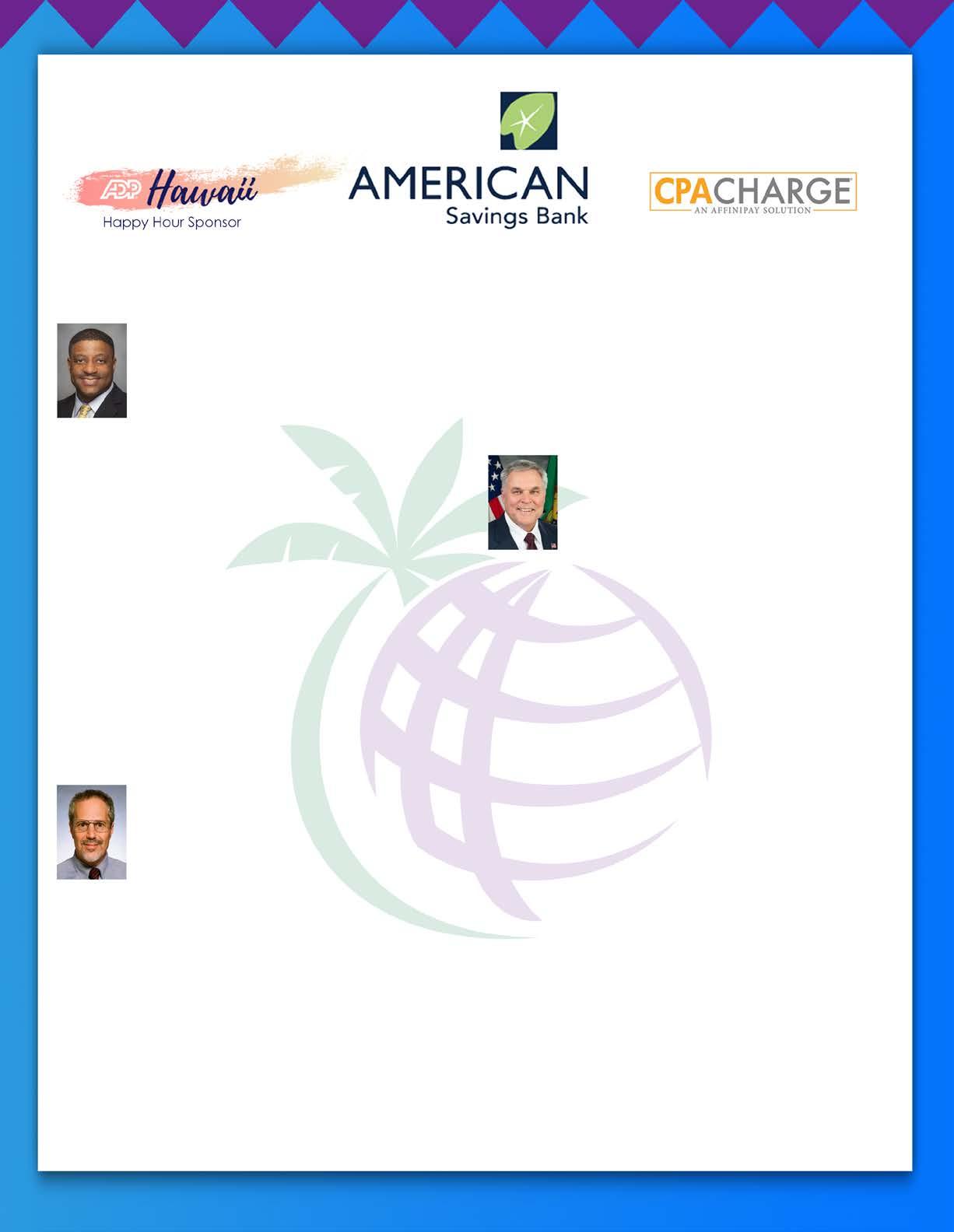
During the COVID-19 pandemic, the IRS processed more than $1.5 trillion in record economic relief and individual refunds. As part of a larger outreach effort to reach underserved communities, the IRS has new, meaningful relationships with more than 15,000 community organizations and 13,000 public school districts. IRS has also aggressively pursued multi-lingual, multi-cultural efforts expanding outreach and assistance in multiple languages, including, for the first time, providing the 20202022 Individual Income Tax Return, Form 1040, in a language other than English (Spanish). Taxpayers can now also instruct the IRS to contact them in writing in a language other than English and basic tax information is newly available in 20 languages on IRS.GOV. During FY22, there were more than 90 million visits to the non-English pages on IRS.gov, most of which did not previously exist.
Chuck is the co-founder of the UCLA Extension VETS COUNT Scholarship Fund designed to provide scholarships for active duty and retired military personnel who are working to realize their career goals in tax, accounting, and wealth management. Prior to joining the IRS in 2018, Chuck Rettig was a practicing tax lawyer in Los Angeles, CA for more than 36 years.
KALA AUGUST 2023 13
Success. Such a simple two-syllable word with great expectations. I think humans are programmed to strive for success in everything they do … from taking their first steps, saying “momma and dadda,” to financial security and a long and healthy life. What if you had a “cheat sheet” of 100 secrets of successful people … would you read it? I definitely would. This book is like a “cheat sheet” and it was great reading it, just like the author’s “100 Secrets of Happy People,” which I reviewed in the May 2023 KALA.

The following secrets from the book are some of my many favorites. I hope you find them as insightful as I did, and they will give you a feel of the book. What was most inspiring was being successful is a personal journey and is not dependent on other people’s opinions, unless you allow it to. I’m confident that if you are reading this, you know that already … CARPE DIEM!!!

There Is Time
Contrary to what the media wants us to believe, there is no age restrictions on success. It takes as long as it takes, and when you reach it, you won’t reject success because you’re not the right age for it.
Seek Input from Your Opposites
You benefit when you involve people in your projects who have traits and perspectives that are the opposite of yours.
 by David Niven
by David Niven
A study has shown workplace teams composed of people with differing personalities are 14% more productive than teams composed of more compatible individuals.
Winners Are Made, Not Born
Case study research on business executives reveals that 98% see their position as the result of their plans and strategy, and more than 50% credit their use of a successful person as an example to help define that plan. Successful people get where are because they learn what it takes to get ahead and follow a strategic plan. Do you have a strategic plan for your career, personal life or health?
Use Your Own Self-Interest
What is the difference between the most driven and the laziest person? Selfinterest. Remind yourself of the value of the things you want, and the costs to you in effort will not feel as great. Researchers find that perceived self-interest is the most significant factor in predicting dedication and satisfaction toward work. It accounts for about 75% of personal motivation toward accomplishment.
Volunteer To Feel Better
Aside from helping our community, volunteering opens us up to a greater appreciation of our own lives. Volunteers are 25% more satisfied with their jobs, have a better work ethic and are more persistent in working toward long-term goals and rewards.
The Past Is Not the Future
Your success is far more dependent on your behavior now than it is based upon where you grew up, what schools you went to, etc. Opportunities lie ahead; it is a matter of whether or not you choose to pursue it. The current behavior of employees are six times more likely to predict job performance than it is their background and job history.
Notice Patterns
What is the great common denominator of intellectual accomplishment? In all subjects the answer is the same: great thinkers notice patterns. The author notes we should take the time to consider patterns in our world that we’ve never thought about before.
Success Is Formula, Not Fantasy
The main difference between people who achieve and people who don’t is simply conscientiousness. People who approach things with order, common sense, consistency and persistence will ultimately succeed.

Embrace Work
Our culture celebrates people who have early success followed by early retirement. In truth, most retirees base their identity on their career and yearn for the activity and responsibility their work
“100 Simple Secrets of Successful People”
14 KALA AUGUST 2023
life provided. The single biggest factor shaping a retired person’s identity is career history, outweighing even family life.
Take Off Your Blinders
Perspective is a powerful force, and stereotypes alter our view of the world. They can have a negative effect on how you evaluate yourself and other people. People who are prone to use stereotypes are 39% more likely to believe that opportunities are limited for themselves and others.
Think About Who You Ought to Be
Do you sometimes wish you were richer, more powerful, more famous, etc.? People who are focused on the “ideal” life they could lead are 34% more likely to be anxious and self-conscious about their lives. On the other hand, people focused on the life they “ought” to lead are more caring about other people in their lives and actually 21% more oriented toward achieving in their career.
Life Is Not a Zero-Sum Game
The quantity of hours spent working or with our families doesn’t predict achievement or life satisfaction. Instead, the quality of those hours – how stressful or relaxing they are – is a much more potent factor in producing a satisfying career and family life.
What We Need, Is What We Need
Success in life is not a matter of getting everything. That’s impossible and wouldn’t be much of a joy even if it were possible. Success is a matter of getting what we need. The author wants us to think of success as filling a box. You’ll be finished sooner, not just by working harder to fill it, but also by choosing a smaller box.
Avoid Roller-Coaster Emotions
A successful life is not to be found in one exciting day but in a steady, productive and fulfilling career. Long-term studies of corporate leaders find that 70% of those who survive longest in their jobs downplay both the best and worst outcomes they experience and keep their feelings relatively steady. They have what psychologists call a “focus on an acceptable average,” not on the extraordinary.
Value Practical Knowledge

Don’t overlook the importance of the practical knowledge you have and the importance of the practical knowledge you can gain by learning every aspect about the things you do. The book notes knowledge gained through workplace experience was six times more important than grades earned in school in predicting job performance of new employees.
on them when you retire to see if you reached them. Successful people spend at least 15 minutes every day thinking about what they are doing and can do to improve their lives.
Don’t Settle
Most people will not buy a house or car unless they are completely happy. Yet when it comes to a job, many people “settle” on a job they may not be completely happy with. The author emphasizes, never stop thinking about what you need to do to love what you do.
What Is the Point?

The single most important thing you can achieve is find meaning in your life. Having a purpose in everything you do makes every day valuable and every outcome, good or bad, worthwhile. Research shows feeling there is meaning in your life is eight times more likely to produce satisfaction than is a high income.
Take Action
Money Isn’t Everything
In national surveys comparing income with lifestyle and satisfaction (among people who have enough to live on), salary increases have no effect on life satisfaction and little influence on work habits.

Keep Your Goals Visible
Your goals should be an ever-present part of your life, offering you direction and encouragement. Create them, use them, follow them, update them, live by them. Don’t hide them away and check back
Sharks have to keep moving forward to live. Like sharks, people need to keep moving forward in order to achieve their dreams. You need to do something every day. On the contrary, a study has shown those who don’t feel like they are taking steps toward their goals are five times more likely to give up and three times less likely to feel satisfied with their lives.

KALA AUGUST 2023 15
Highlights of the 2023 Annual Election & Business Meeting
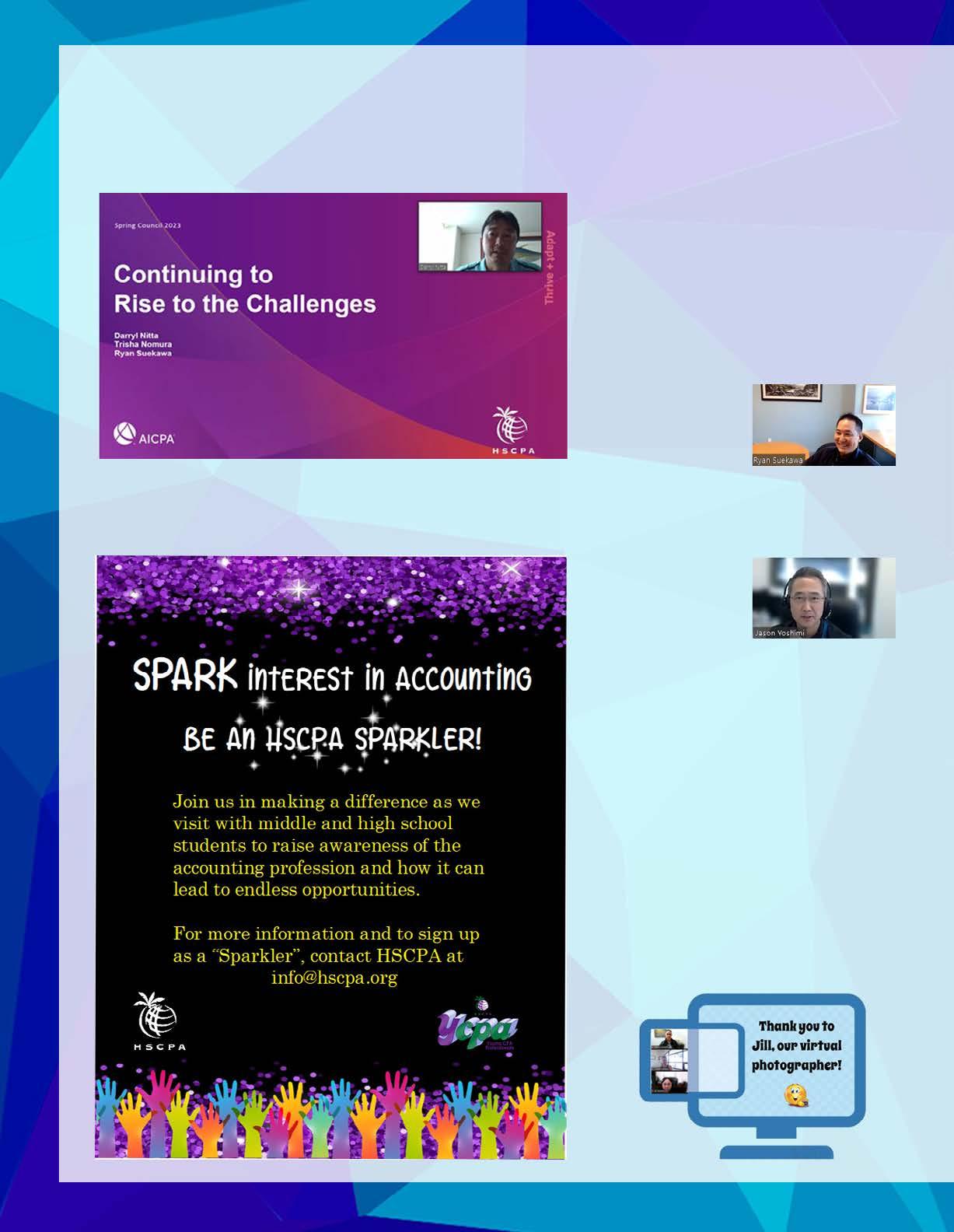

“Virtually” speaking, it was nice seeing HSCPA members at the Annual Election * Business Meeting on June 30th. Nice, smiling faces graced our screens as we elected and installed the 2023-2024 HSCPA Board of Directors. Beginning his second year of the biennial term, President Ryan Suekawa welcomed members and recognized a distinguished group of past presidents of the HSCPA.
President Ryan was especially thankful to all members for supporting the HSCPA, the Board of Directors, young professionals group, and staff as we all continue to navigate through challenges and uncertainties of the profession.
Thank you to past president, Jason Yoshimi (2010-2011), for conducting the installation of the 2023-2024 officers and directors. Aside from his real job as President & CFO of HEMIC, Jason continues to be involved with the HSCPA as we wrestle with the pipeline challenges.
Our AICPA Council representatives, Ryan Suekawa, Trisha Nomura and Darryl Nitta, provided an update on major issues affecting the profession which included guidance in the tax environment, enhancing audit quality, rowth in ESG assurance, and exploring options to reverse the loss of students to become CPAs, and driving students’ interest in pursuing accounting education from a younger age.
16 KALA AUGUST 2023
There was a lively and open discussion on the pipeline challenges, enrollment decline of accounting majors in Hawaii, and the possibility of creating a dual credit high school/college credit course between Hawaii DoE and UH.
At the national level, we are actively discussing with the AICPA, state societies and other stakeholders on developing a nationwide pipeline strategy about how to implement a consistent, easy-to-replicate process. Any strategy will require everyone’s input and support as we continue to address consistent hurdles being the CPA Exam and required education for licensure, the cost and opportunity cost of licensure, and the perceived ROI and work culture. The AICPA’s Pipeline Acceleration Plan and the upcoming national pipeline strategy development are intended to address finding solutions or mitigations for these and other factors.
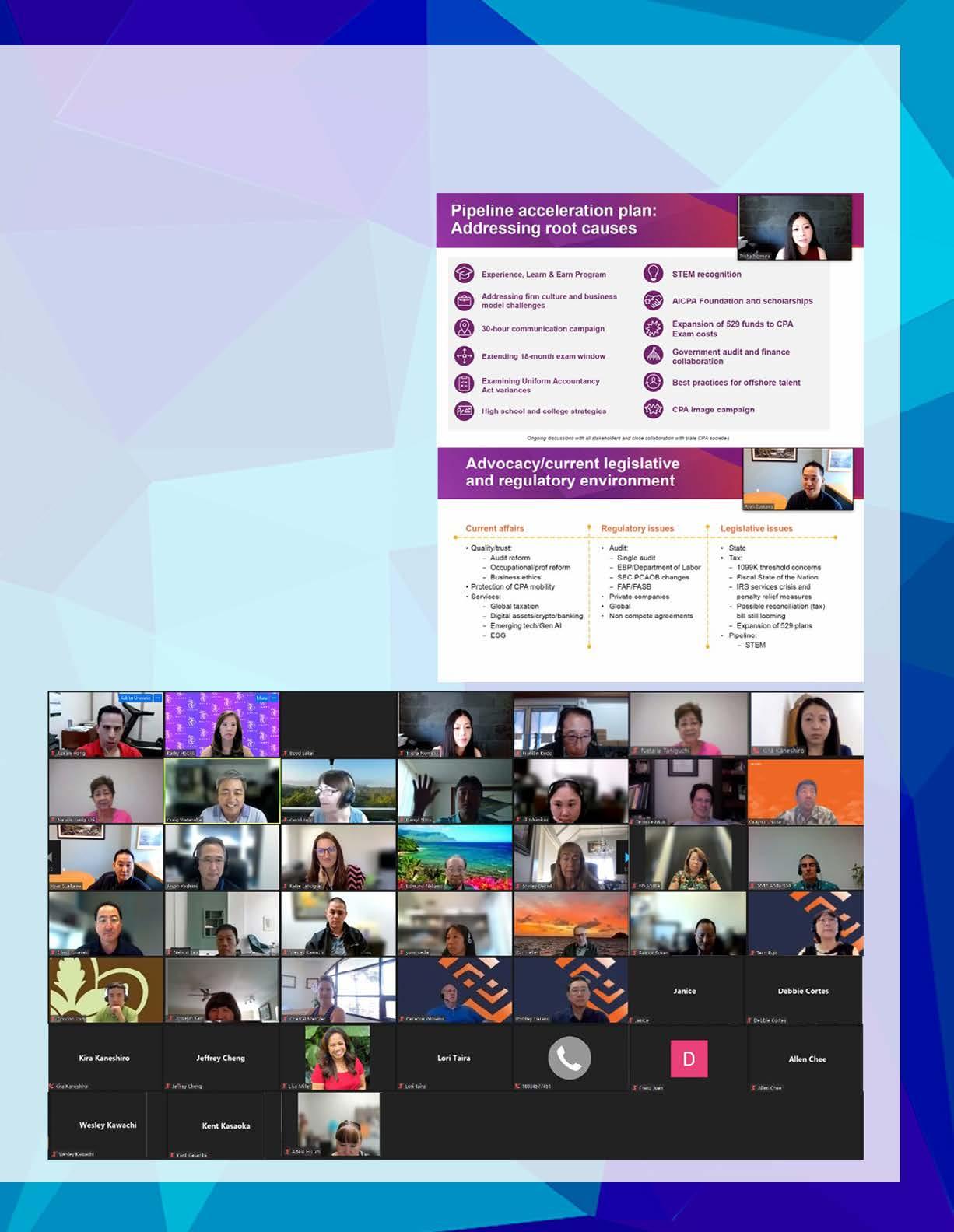
Stay tuned and get involved – contact the HSCPA for volunteer opportunities!

KALA AUGUST 2023 17
Goodbye, BEC: Understanding the New CPA Exam
With the BEC section of the CPA Exam slated for elimination in January 2024, CPA candidates are clamoring to pass it while they still can. While the license’s fundamentals are untouched, substantial changes are in store for the Exam’s content and structure.
Three new exams, called Disciplines, replace BEC and allow candidates to align their studies with their future career path. Since the final date to take the old Exam is fast approaching, we’ll address what’s changing, what to expect on the new Exam, and if it’s better to take BEC now or wait until the new Exam launches in January.
Surviving the Shift in 2024
The license itself won’t change. Candidates still need to pass four sections but now have a choice of Discipline beyond FAR, AUD, and REG (referred to as the Core). Candidates can still take the Exam in any order. If a candidate has previously passed BEC, it will count in place of the new Discipline.

Regardless of which Discipline a candidate chooses, everyone who passes the four required sections will obtain the CPA designation with no special differentiations or
By Megan Lewczyk, CPA, CMA
additional acronyms. The content continues to evaluate professionals with 1-2 years of experience, and initial licensure doesn’t aim to show expert-level understanding.
All sections on the Exam have had major changes to the content and structure, not just for BEC. The AICPA recently completed a practice analysis to help determine the relevancy of all content and refine what it should test in each section. Based on this analysis, the revamped Exam integrates more data and technology, emphasizing supporting documentation and source data. Candidates will need to demonstrate how this data can be used to correct errors and verify completeness and accuracy. A full list of content in each section is available on aicpa-cima.com under CPA Exam Blueprints.
Decoding Disciplines
The new Disciplines include Business Analysis and Reporting (BAR), Information Systems and Controls (ISC), and Tax Compliance and Planning (TSP). The Exam will no longer include written communication or research questions. Much of BEC’s content will migrate to the Core exam sections, with
Hawaii Practices For Sale
Gross
economic concepts moving to AUD and financial statement ratios moving to FAR. Each Discipline will include more in-depth topics and specialized skills, but still will focus on candidate with 1-2 years of experience and the complexity will be aligned accordingly.
BEC now or wait?

Whether to take BEC now or wait for the changes depends on a candidate’s situation. There is no wrong choice. If re-testing, consider doing it as soon as possible due to your familiarity with the BEC content and the availability of high-quality review courses. First-time takers have more flexibility and may consider waiting to focus on a Discipline that aligns with their career path. However, it’s important to know that score release might be slower in the new system, and initial CPA licensure may take longer.
Lastly, keep these important dates in mind: The last day to test under the old format is December 15, 2023, and there’ll be no testing between December 16, 2023, and January 9, 2024. The application cutoff for Hawaii CPA candidates to take BEC is October 1 for first-time test takers and November 12, 2023, for re-exam candidates. The new exam format will start processing applications from November 22, 2023. And for those worried about lost exam credit during the change, Hawaii and most jurisdictions are extending credit for all passed sections as of January 1, 2024, to June 30, 2025.
Thinking of Selling Your Practice?
For detailed information on NASBA’s transition policy and other critical dates, please refer to the following resources: NASBA Transition Policy and Key Exam Dates.

18 KALA AUGUST 2023
revenues shown: Kamuela/Waimea Area Tax & Bookkeeping $268K; Kailua/Maui/Honolulu CPA $530K; Kauai, Maui, Honolulu $600K; For more information, please call 1-800-397-0249 or visit www.APS.net to see listing details and register for free email updates.
Accounting Practice Sales is the leading marketer of accounting and tax practices in North America. We have a large pool of buyers looking for practices now. We also have the experience to help you find the right fit for your firm and negotiate the best price and terms. To learn more about our risk-free and confidential services, call Ryan Pannell with The Holmes Group at 1-800-397-0249 or email Ryan@apsholmesgroup.com.
By Joy Takaesu of The CPA Collective

Microsoft announced plans to retire its built-in Windows Mail and Calendar apps. Microsoft will automatically migrate existing Mail and Calendar users to its new Outlook for Windows app starting in August. The new Outlook for Windows interface can be previewed by clicking the “Try the new Outlook” slider in the top right corner in the Mail and Calendar apps. Microsoft plans to add third-party support for Outlook for Windows for email providers such as Gmail, Yahoo, and iCloud, as well as support for connecting through IMAP.
According to Microsoft, “Beginning in 2024, new Windows 11 devices will be shipped with the new Outlook for Windows as the default mailbox application free for all to use. The Mail and Calendar applications will continue to be available via download in the Microsoft Store through the end of 2024.” After that, the Mail and Calendar apps will no longer be supported.


For those using Microsoft 365, Microsoft plans to expand its detailed security logging features to more customers for no additional cost. Previously these logs were only available with the E5 plan, which is $57/month/user.
Starting in September, Microsoft will offer Purview Audit Standard for all government and commercial customers. The US Cybersecurity and Infrastructure Security Agency (CISA) has been coordinating with Micro-
soft to provide security logging features that would help organizations to detect and investigate a potential compromise. Microsoft emphasizes that logging itself would not prevent attacks, but the audit logs can provide useful information when examining suspicious activity or for incident response purposes.
Microsoft says that its customers can expect
Continued from page 11
and benefits to attract the best talent. Scrimping on salary offers is false economy, as ultimately the only way to increase partner incomes is to have a capable team. Beyond salary, prospective employees should be offered opportunities for career progression, professional development, and remote working flexibility to make them feel valued within the firm. Don’t fall into the trap of paying more for new hires than you’re paying existing team members doing the same role – give respect if you want respect.
Think about how your strategic plan incorporates these concepts – it might be
“deeper visibility into security data, including detailed logs of email access and more than 30 other types of log data previously only available at the Microsoft Purview Audit (Premium) subscription level.
In addition to new logging events becoming available, Microsoft is also increasing the default retention period for Audit Standard customers from 90 days to 180 days.” Those who already have the Premium E5 tier licenses will receive longer default retention periods and automation support for importing log data.
If you have any questions or comments, please call me at 808-837-2517, or send email to jtakaesu@thecpacollective.com.
time to revisit the “employer of choice” section of your plan (or perhaps include it for the first time)!
Giles Pearson FCA was a PwC Partner for 18 years before jointly setting up Accountests
Steve Evans has a whole career dedicated to enabling employers to attract, recruit, develop and retain talented individuals and teams, with particular expertise in candidate testing and assessment before setting up Accountests.
Accountests deliver the world’s only online suite of annually updated and country-specific technical knowledge tests designed by accountants for accountants and bookkeepers. www. accountests.com.
Reprinted with permission from the Nevada Society of CPAs

KALA AUGUST 2023 19
Imagine ...
n Having a CPA Professional Liability Insurance policy that addresses the scope of services you provide.
o Having direct, unlimited, no-cost access to specialists and risk management resources to help address the concerns and issues you face as a CPA.
p Your insurer having your back.
CAMICO offers far more than just a Professional Liability Insurance policy. That is why about 8,700 CPA firms nationwide choose CAMICO for their insurance and risk management needs. With competitive rates, robust insurance, and superior service, CAMICO provides peace of mind. Call us today to learn more.
Harris
Hauptman, Senior Account Executive

T: 800.652.1772 Ext. 6727

E: hhauptman@camico.com
W: www.camico.com

ALL GOOD CONVERSATIONS START
WITH AN
Interested in a no-obligation comparison quote? Call or email me. Accountants Professional Liability Insurance may be underwritten by CAMICO Mutual Insurance Company or through CAMICO Insurance Services by one or more insurance company subsidiaries of W. R. Berkley Corporation. Not all products and services are available in every jurisdiction, and the precise coverage afforded by any insurer is subject to the actual terms and conditions of the policies as issued. ©CAMICO Services, Inc., dba CAMICO Insurance Services. All Rights Reserved.










































